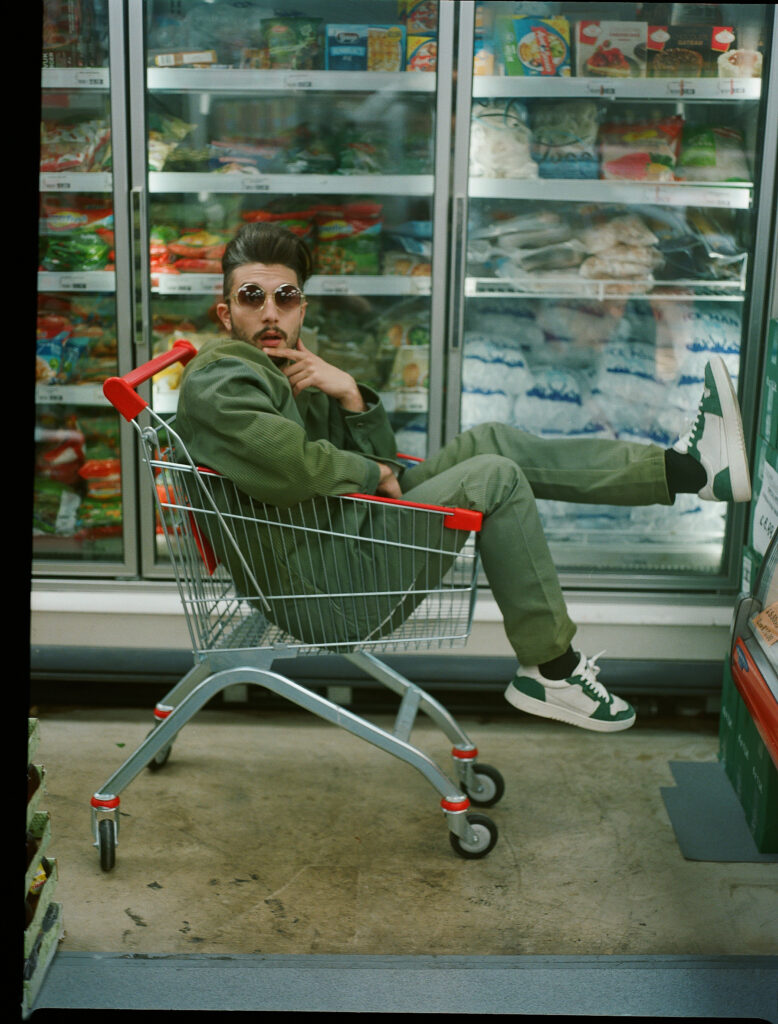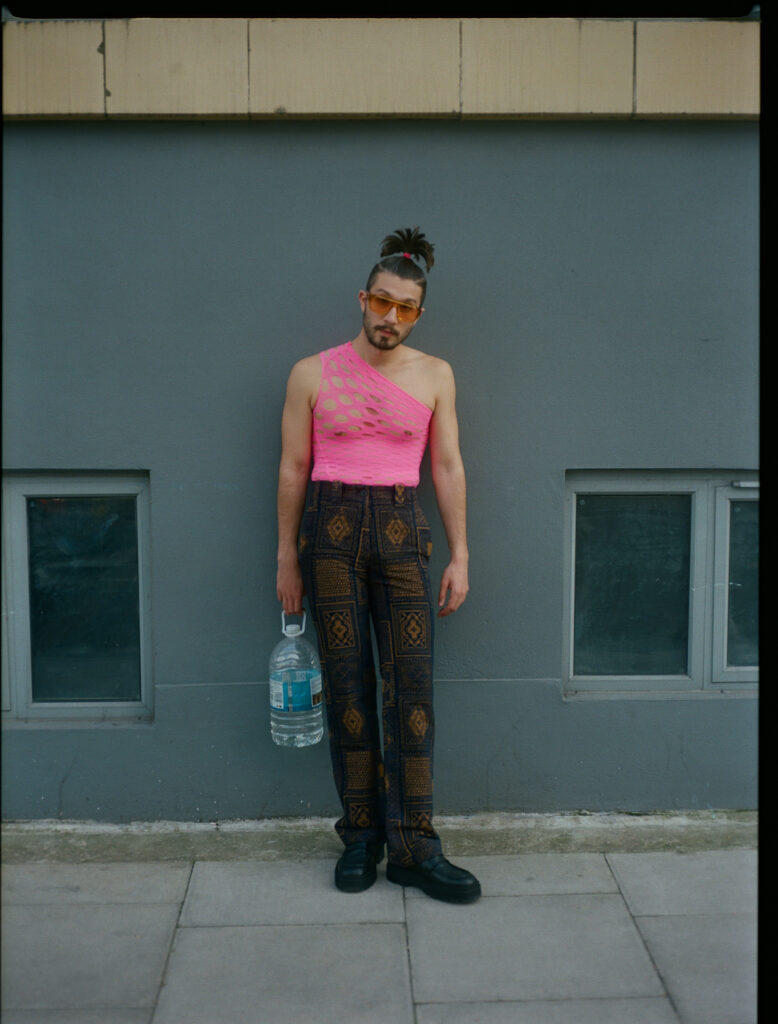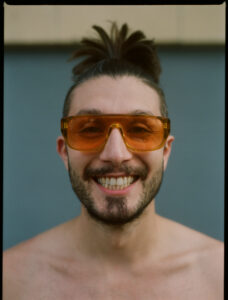“Doesn’t matter what you call me,” bbno$ says, in response to my question of how to address him. He tells me that most people shorten his given name, Alexander [surname, Gumuchian], to Alex because “it’s a lot of syllables.”
Alex has just come off a 14-hour video shoot for his new single “pogo,” calling it “very funny, cool and quirky.” (It’s all of those.) He’s on vacation now, but “chill,” and doesn’t consider this interview work. Later this week he’s looking forward to remixing his new album.
We meet virtually, a few weeks before he turns 27, almost three years to the day since the June 2019 release of his mega-hit with producer/songwriter Y2K “Lalala,” and that unforgettable, first-line rhetorical ponder: “Did I really just forget that melody?” Straight off, he’s smiles warmly, unassuming, his tussled hair paired with his signature specs. Though somewhat subdued, there’s nothing understated about his intelligence and relatability. For a guy that lives publically so laugh-a-minute large, he’s remarkably down to earth.
Judging by what we’ve witnessed, you might think that a kaleidoscopic funhouse follows where ever he goes. You’d be as right as you’d be wrong. Gigantic hits are guaranteed though, not-at-all-excluding the aforementioned summer banger “pogo,” a collab with trailblazing DJ Diplo, the video introducing the two in retro patchwork denim, surrounded by polyester-clad party guests, Jell-O molds, deviled eggs–and plenty of multi-purpose (to say the least) pogo sticks.
[embedded content][embedded content]
However, if we learned nothing from Shakespeare, it’s that the “fool” is the smartest guy in the room. (Not to mention the most steadfast, truth-saying, and the one we want to watch.) He won’t reflect any of that fun-guy character now, though. He’s off-duty: quiet and polite and thoughtful. He ponders the potential success of “pogo,” while picking at his finger until it bleeds, lifting it into focus, then sucking on it in hopes that it clots faster. “Science,” he mumbles, finger in his mouth, “that’s what I studied in university.”
In the midst of conjuring a breakout career, in 2019 the Vancouver native graduated from the University of British Columbia Okanagan with a degree in kinesiology, the biomechanical study of movement. Completely relinquishing bragging rights here, he’s further discounting the brains required for any biomedical degree, claiming that his time at university made him an expert researcher and copycat, an astounding admission for an artist whose career wreaks of originality.
“I went to university…and the only thing you really get good at is research and an effective way to copy people without getting caught,” he says. “That’s kind of university in a nutshell. I’m pretty good at doing research and using the internet in my favor to exploit in a sense. Perhaps I do my own thing, but I also just reiterate it and regurgitate…then I just do my own way.”
Most would argue that catapulting from university to superstardom, and making it look like a puddle jump, requires far more than dumb luck, and he’d agree—sort of. After all, it’s really “Lalala” that branded bbno$ as an artist defined by fire-hot collabs, meteoric singles, and even his dichotomous, self-effacing, fun-suited persona. Though he knew the song was great, he had no idea it would be so huge, and doesn’t necessarily consider its insane success a positive. “I don’t know if anyone should ever experience such a ginormous hit,” he says. “It’s just not healthy. It puts everything on a parabolic scale and then everything will come down eventually and no one really necessarily planned or had me emotionally ready for things to come down.” Somehow, he managed to maintain a full college course load, making time to work on his music, forgoing the entire college party experience to make it happen.
“I didn’t expect the song to be that big. I don’t think anyone could have period, but I knew the song was going to do well. I just had a feeling. I was like, ‘This song is so fucking catchy, full stop.’ Everything about this song is just like a hook. I remember when we made it. The last verse on it. Ari and I were like, ‘Dude, fuck it. This song’s so catchy.’ I don’t even say anything at the end of it.
“That’s how deep down we knew and I remember telling everyone. I manifested it. We were expecting 30 million first year at that rate, and that would’ve been guaranteed my biggest song. Miles, miles away at that point. I couldn’t have asked for a blessing like this, but I felt ready, it felt very right. I saw these people around me having success, having this, having that and then I was like, I’m not necessarily jealous. I was just like, where’s my break? Give me a fucking break.
“I do work my ass off and I think people, especially my fan base, they can tell. I’m not gifted by any shot. I just know what sounds good through repetition and through work ethic. I was very prepared.”
After pointing out his remarkable humility, he notes that it’s not always the most positive character trait. “I think it honestly does less for your career because people want to live vicariously through someone, whether you’re a douche bag or not,” Alex says. “I think if anything being a douche bag, especially in the music world makes you less accessible. In that case itself, it in turn gives you a foot up.”
Thanks to his solid, loving family that praised kindness over all else, Alex feels he doesn’t have any true “douche bag” potential in him. “It’s because I was born and raised in a family of just being nice and I was homeschooled and I just play video games on my time off, whenever I have it.”

As with all of the most daring feats, it seems bbno$’s career was all part of a finely tuned and orchestrated plan—to a certain extent. The talent part is the most obvious, below the surface is an expert navigator, marked by brutal honesty about his industry and, at times, himself. “I’ve been fortunate to stay independent, so I don’t have to really listen to anyone, but at the same time it’s all a façade being on a label,” he says. “They’re just a bank and I have to spend my own money to do everything the label does. My business is completely, undeniably run like a label, full stop. I’m pretty much doing everything that everyone else does, but I just don’t have to fit the linear format of doing things.
“It’s definitely a blessing, but it’s also a curse, too, because I do most of everything in my business. I have tons of gray hair coming in and I’m only 26. Do I think it’s great? I don’t know…” He hopes to be able to “offer sound advice and be a role model for other artists” starting out in the industry, or even start something new that reflects the necessary fairness in the industry “because 90% of the time, it’s not.”
All that said, he compliments Columbia Records on how they handled “Lalala,” revealing that he spent an initial $12—precisely $10, with a PayPal processing fee of $2.40—for guerilla marketing. “I got a meme made and the guy just edited some stupid shit together and posted it everywhere,” he says. “At that point, all these meme pages on Instagram. This was when Instagram was a little bit more influential than TikTok, but this is when the transitioning was hitting.”
It caught fire on TikTok. “It just exploded,” he says. “I just remember tons of the TikTokers at the time were like, ‘Everyone’s using it, man. Everyone’s using it.’ I’m like, ‘What the fuck does that mean?’ It was cool. It was a very interesting experience. That’s all I can really say. It was very interesting.”
To know bbno$ is to love his TikTok, a tool he uses to its fullest, to continue to create “very interesting” and often hilarious experiences. He explains the method behind his controlled TikTok madness like the Dr. Alex to his Mr. bbno$: “At the same time, let’s say you have seven pumper TikToks, some crazy 40, 50 million view TikToks in a row, God forbid, knock on wood that would happen to someone. That reach is just vastly more superior on a global basis than it is just in a regionalized market. I’ve had success on radio in other markets, but it doesn’t really do anything. It’s like, ‘Oh cool. This artist is going on the radio.’ But it doesn’t help you sell tickets because the people going to my shows aren’t going to be 35, 45-year-old people listening to the radio.
“It’s just like a bonafide stamp that allows you to get press in the markets that truthfully doesn’t really do anything, as well. It’s likely to encroach on ticket sales and longevity, you just need to be able to find a pocket on the internet and feed that pocket and feed these people who want to be entertained and have a desire to be entertained. That’s pretty much it. My fan base is a bunch of nerds, a bunch of weird people like me that when I do my shows and I meet them, I do my meet and greets.
“It’s interesting because the energy I put out on the internet is what is received and what is reciprocated through. I can see that through my fans and everyone that comes to my shows at the merch table, always the merch sellers are like, ‘Your fans are the nicest fucking people I’ve ever met.’ I’m glad because that’s the energy I put out there. The energy put out there is what you receive.”
Yes, he invites you to roast him, but no, he doesn’t read them all. There are simply too many comments.
“Some are pretty funny, but I don’t go out of my way to read negative comments,” he says. “Obviously, the negative comments speak way louder than positive comments… I have 1.7-plus-million streams a day on my music just alone on Spotify. It’s cool, but at the same time, it doesn’t really mean anything at the end of the day. That is obviously a stamp of approval. I would say, the negative comments, they speak louder. When I ask people to roast myself, it’s because I’m in on the joke. I don’t care. Everyone has an opinion. People, especially on the internet have very loud opinions and it’s like, ‘If I ask people to roast me, it gives them a reason to comment and algorithmically…it’s going to go up and the video will do well.’ It’s all just a finesse at the end of the day. Truthfully too, if you take yourself too serious where you can’t take constructive criticism, are you in the right business?
“You got to play the game or the game will play you.”

His new album won’t be designed for TikTok.“For a while, I was like, ‘Oh, we need to make TikTok moments.’ But then I was just like, ‘I don’t fucking care anymore.’” he says. “Because we weren’t back in the day. It was just all a natural experience or the natural flow of writing music was just how it went. Then it transitioned into ‘TikTok moments.’ I found myself trying to re-emulate those things and those moments, but it just didn’t do my music justice.” He calls the upcoming album, with a projected September release, his best work so far.
That’s not to say he considers himself the most talented guy in the room, far from it: “Do I think I’m incredibly gifted and talented? No. Do I think I just worked at something for seven years straight? Absolutely. Do I think I’ve wasted seven years of my life? Perhaps, but at the same time, I’m financially stable and safe…I can retire whenever I like and I’m happy that I can do that and I can travel the world and do what I want, but as of right now, I want to just keep doing music.”

The concept of validation—the need for validation—is something he’s been thinking about a lot lately. “I don’t think it’s necessarily validation, it just feels good when you map the time, and it takes off. It’s like, ‘What am I doing this for?’ I make music because I like making music, but it’s like, ‘What’s the point of making a product that won’t sell?’ Yes, surely I’m doing it because I like making music and I have a passion for it, but at the same time, you build a house, you live in it for three years, but then like, ‘Damn. I want to sell it.’ It’s not like you’re going to sell it for less than what you bought it. It’s just common sense. But at the same time, artistically If I am to speak on just being an artist, then it doesn’t matter. You make the [music] you love and you post it, but at the same time, it’s like, ‘Why not just do that and then also have it succeed?’ Because that would be the best of both worlds.”
Years of striving brought burnout, but he’s happy now that he’s made his parents proud. “I remember someone told me you got to separate your emotions from the business side of things and my business is working and end of the day, work is part of life. If you want to work, you might as well be working positively on an upward scale. Not necessarily parabolic, but just ideally things go up.”
He’ll have only 17 days off by the end of this year, highlighted by a wide-spanning tour with rapper Yung Gravy. In the midst of all this, he’s made the decision to move back home.
“I could die tomorrow. Shit, my friend just brought me some food and it could be all poisoned up and I could die,” he says. “That would be dope for the interview because you were the last bbno$ interview. I’m giving you the rights to use that if I were to die right now.”
I steer the conversation back to the definition of success and what it means to him. “That’s a very difficult question,” he says, all joking aside. “It’s very profound because…who knows that answer?”
We circle back to the idea of family, especially his, providing him with a solid foundation of values. When I remind him that success isn’t all about business, he agrees: Yes, he’s successful.
“I got a family that’s primarily healthy and loving and I love my brother and sister. That’s all that really matters. I’m literally selling my apartment and moving back home with my parents. Because then I get to go home and my mom nurtures me and gives me the good food and shit and it’s great.
“You leave your parents and go make it,” he says. “Once you’ve made it, who fucking cares?”

Leave a comment